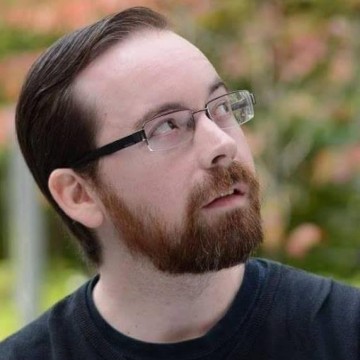‘Beau is Afraid’ Explained: Thank You, I’m Sorry
Beau is Afraid is filmmaker Ari Aster’s most ambitious movie yet. After watching, viewers will have a lot to process. This article helps interpret some of the movie’s most important moments.
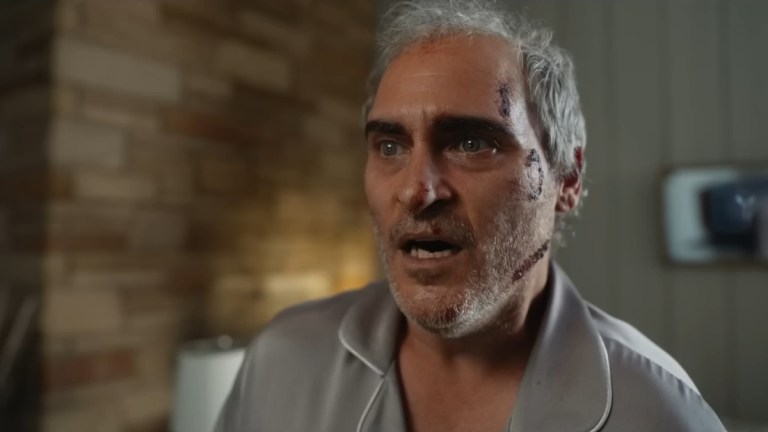
Table of Contents
Written and directed by Ari Aster (Hereditary, Midsommar), Beau is Afraid stars Joaquin Phoenix as a man with a myriad of problems. It is a complex film filled that challenges viewers to interpret its bizarre reality for themselves. This article offers one interpretation of many of the main points made throughout Beau is Afraid.
What is Beau is Afraid About?
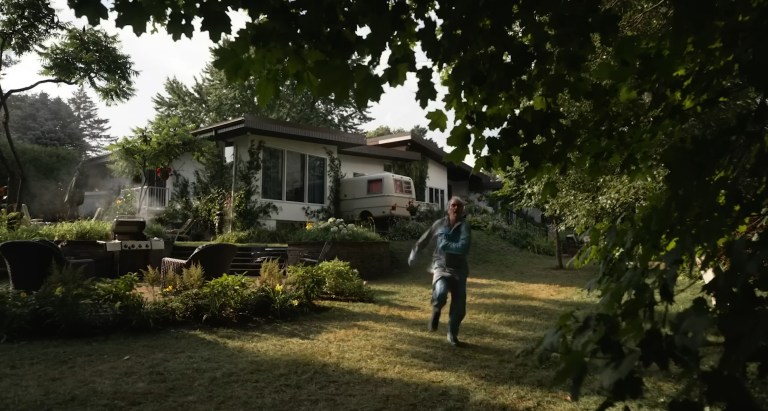
At its core, Beau is Afraid is about a man’s relationship with his mother. That man is Beau, a schlubby, neurotic person whose entire life is shaped by his mother’s form of “love.” Throughout the film, we experience what it is like to be Beau as we take a journey with him through his entirely subjective point of view. What we see and hear in Beau is Afraid isn’t the reality we’re accustomed to. Rather, we see the world through a dream-like lens that urges us to feel rather than try to make logical sense of what is happening.
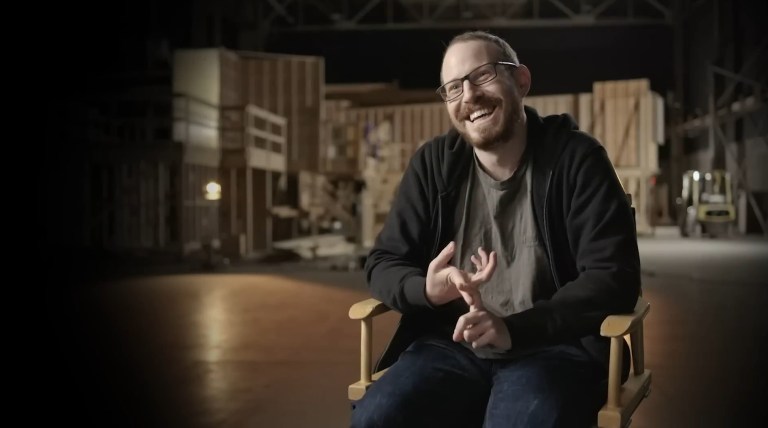
The plot of Beau is Afraid involves Beau’s attempts to visit his mother at her home. In the beginning, Beau’s trip is meant to be his yearly visit to his mom on the anniversary of his father’s death. But when Beau misses his flight due to a series of bizarre circumstances, his plans change. Beau gets news that something awful happened to his mother, and now Beau is even more desperate to get to her house. Unfortunately, as Beau goes on a series of improbable adventures on his way to his mother’s house, it seems as if the entire world is trying to stop Beau from achieving his goal.
Part twisted fairy tale, part riff on a hero’s journey, Beau is Afraid is a nightmare comedy that works on multiple levels. The movie is dense with meaning and metaphors, but it also isn’t afraid of throwing heaps of crass comedy at the audience. As with all of Ari Aster’s movies so far, every frame is packed with details that invite investigation. Some of those investigations may lead to little more than a joke or reference, but others give viewers a greater understanding of the film’s main character. Few things are straightforward in Beau is Afraid, and that’s why it is so incredibly interesting.
The Story of Beau is Afraid, Explained
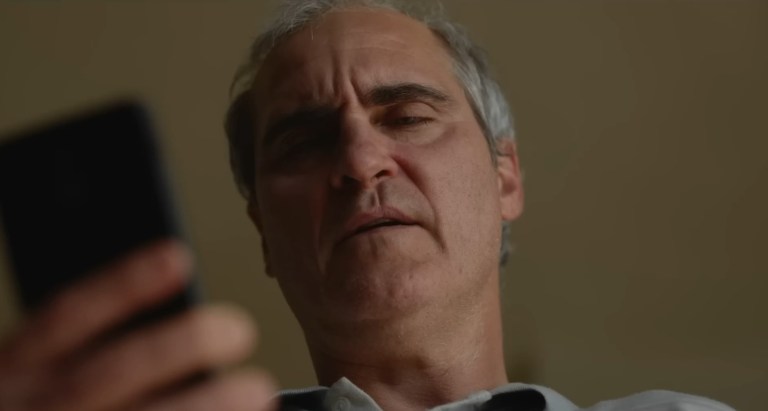
At roughly three hours long, there is a lot going on in Beau is Afraid. To explain everything in detail would take a long time, but to explain everything could also take away from the experience of watching the movie. Beau is Afraid isn’t a puzzle to be solved, it is a representation of emotions meant to be felt. The film is structured in a way that can lead to multiple interpretations, and differing interpretations can all be valid. With that in mind, the following explanations are meant to give one view of Beau is Afraid without discounting other views.
Beau is Afraid can be broken down into a few distinct chapters. To help keep everything organized and easier to follow, the following sections are separated by chapter with interpretations of each section’s main points. There is a lot more to explore, but this will give you a good overview of the movie. Plot explanations will be kept brief, so it’s probably best if you see the movie first before jumping in. Major spoilers lie ahead.
Beau’s Apartment: A Hostile World
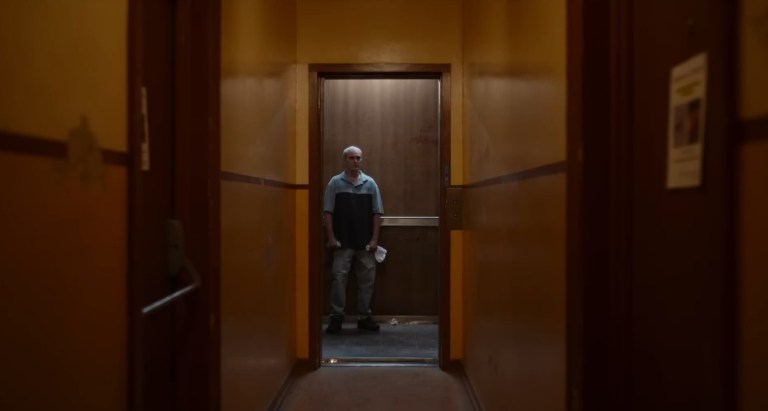
Prior to Beau’s journey, we get to know Beau by joining him in a therapy session and seeing how he lives. From his reactions in therapy, we get the sense that Beau is burdened with a tremendous sense of guilt. We also get the sense that much of Beau’s guilt is related to his mother. Beau’s therapist gives him a new prescription for his anxiety, which really only gives Beau something new to worry about.
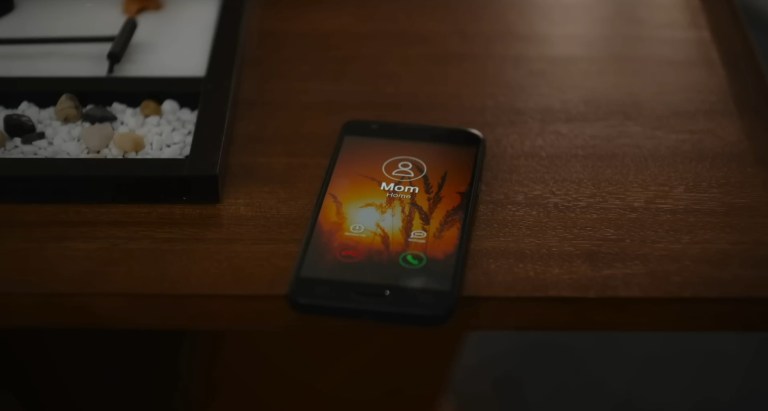
When Beau goes to his apartment, we see the outside world as an incredibly hostile and callous place. People laugh about trying to get someone to jump to their death from a building, the streets are packed with people who are angry or self-absorbed, and a naked killer called “Birthday Boy Stab Man” is roaming the streets. It’s a comically dangerous world which fits Beau’s state of mind. He believes everyone is out to get him, and in his version of reality, it’s true.
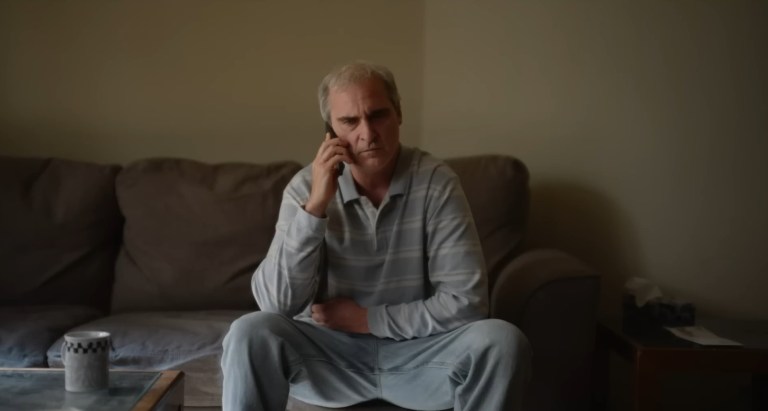
Beau’s apartment is in a rundown, graffiti-covered building. Much later in the movie, we learn that just about everything in Beau’s apartment is part of his mother’s business empire. The frozen food he eats, the dental floss he uses, and even the apartment building itself all come from his mother’s work. So, symbolically, even when separated, Beau is living in a world created by his mother. Beau is out of shape, so it’s clear the food isn’t terribly healthy. The apartment is drab and broken down, just like Beau. The apartment is a metaphor for Beau and his mental state, and the fact that it is created by his mother indicates that Beau’s own problems all begin and end with her. After all, Beau was also created and shaped by his mother.
Grace and Roger: A Surrogate Son
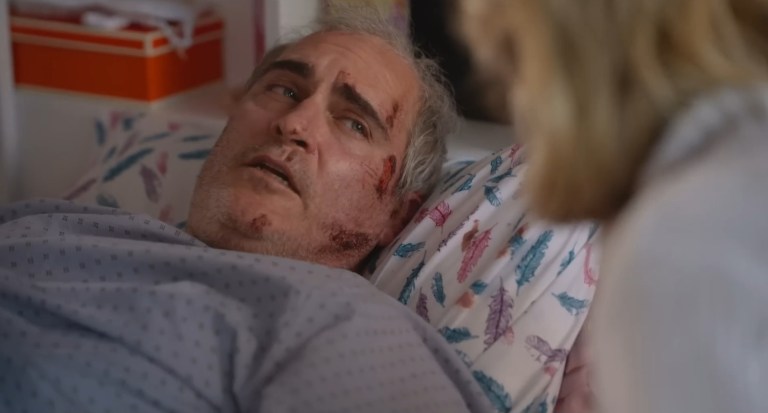
After learning that his mother has been killed by a falling chandelier, Beau falls into a state of shock that is exacerbated by an intruder hiding in the ceiling of his bathroom. Beau runs out into the street for help and is hit by a van driven by a woman named Grace. Beau wakes up a couple of days later in the home of Grace and her husband Roger. Roger is a surgeon who has attended to Beau’s wounds, and the whole situation Beau finds himself in feels benevolent yet exceedingly odd.
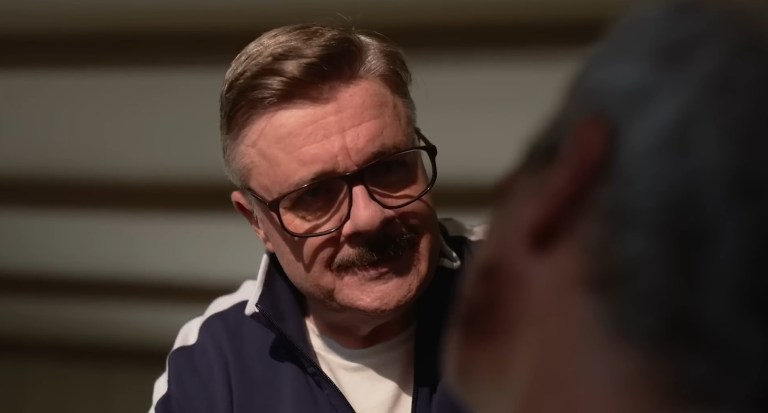
Beau knows something is wrong right away when he notices the ankle monitor he wakes up with which Roger excuses as a health monitor. Beau doesn’t want to make waves though, so he just accepts what is given to him, conditions and all. As Beau’s stay at their home lengthens unexpectedly, it becomes clear that Roger and Grace don’t want Beau to leave. It turns out Grace and Roger had a son named Nathan whom they lost when he was killed in action while in the military. Grace in particular seems to want to keep Beau as their new son. At one point she hands Beau Nathan’s coffee cup before quickly drawing it back when Roger enters the room.
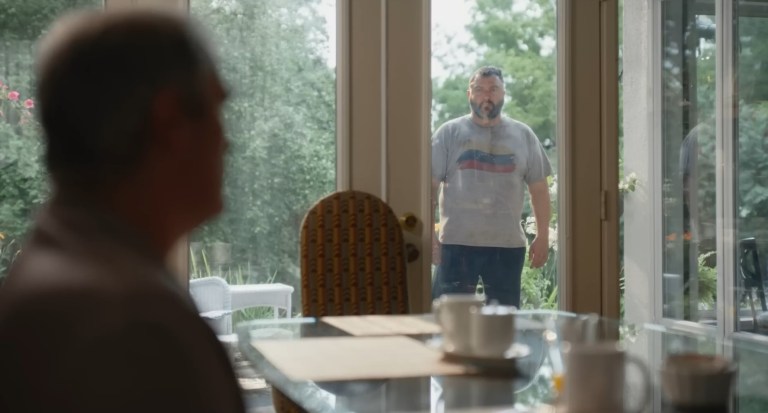
Grace’s immediate attachment to Beau can be seen as analogous to his own mother’s unhealthy attachment that we learn about over the course of the movie. Grace appears to care for Beau unconditionally, and that makes Beau feel uneasy. Beau doesn’t know how to be loved, so Grace and Roger’s kindness confuses him. But of course, nothing in Beau’s life comes free of consequences. Beau, just by existing, is causing Toni, Grace and Roger’s daughter, intense pain. Beau hasn’t done anything (in fact, everything is being done to him), but his mere presence is disrupting this family. In the end, Beau is blamed for Toni’s suicide when, again, he did nothing.
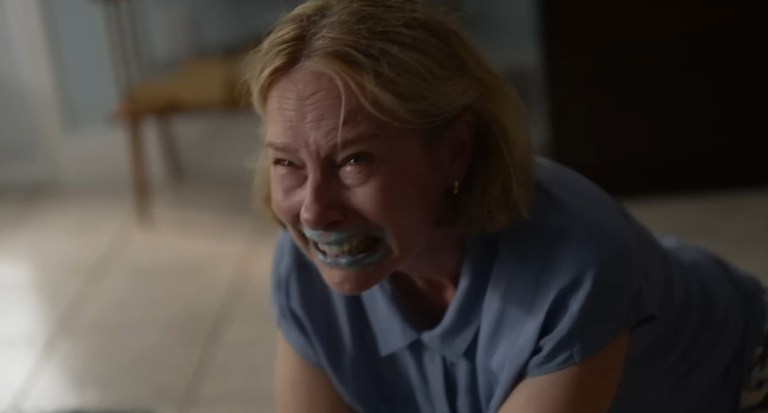
But perhaps doing nothing is part of Beau’s problem, and it always has been. Beau has been conditioned to feel guilty for his actions and emotions, so he has gotten to the point where he puts the feelings of others before his own in every situation. When there is conflict, Beau freezes, allowing others to project their own emotions onto him. And Beau just takes it because he is too hobbled by guilt to stand up for himself. The vast number of times he says, “Thank you, I’m sorry” is an indicator of this.
The Orphans of the Forest: A Life Unlived
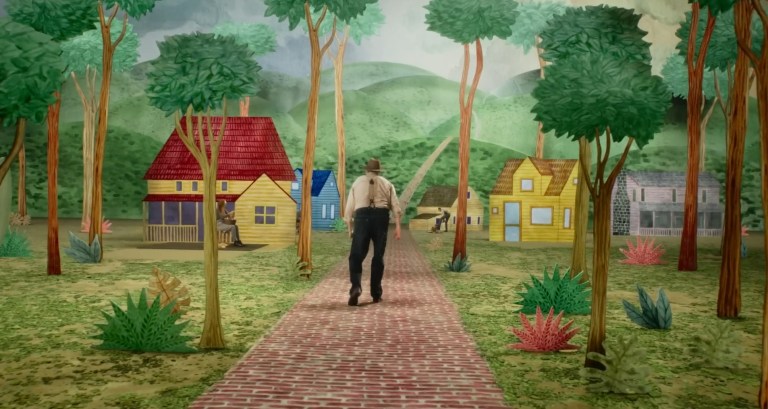
After escaping from Grace and Roger’s house, Beau is lost in the woods. He comes across a traveling group of actors who put on a play. As Beau watches the performance, he imagines himself as the hero of the story. It is a story about a man who finds true love and forms a family, only to have that family taken away by forces beyond his control. The story ends with an elderly Beau coming upon the same play in the woods Beau is watching. Elderly Beau finds his three lost sons, all grown up. They come together in an emotional scene, but there is a problem…
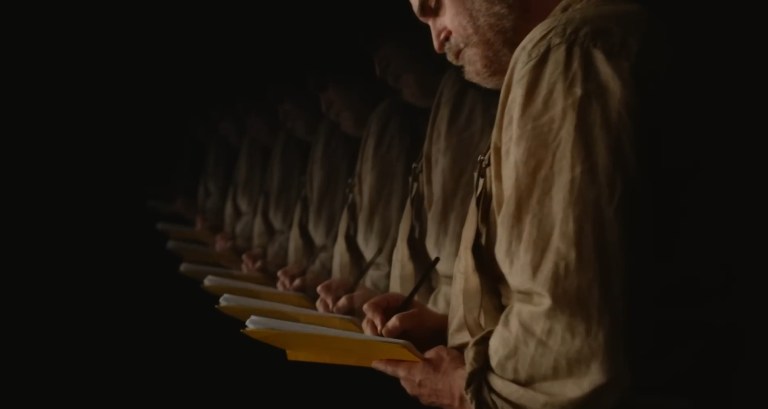
This sequence finally peels back some of the layers regarding Beau’s father. Beau’s mother told him that his father died when Beau was conceived. She says Beau’s father had a heart murmur that, in the moment of climax, killed him. She always told Beau that the heart murmur is hereditary and also affected his grandfather in the exact same way. For that reason, Beau has never been with a woman, and, when you think back to Roger’s comment about Beau’s distended testicles, he has never had an orgasm at all. He thinks he will die if he does.
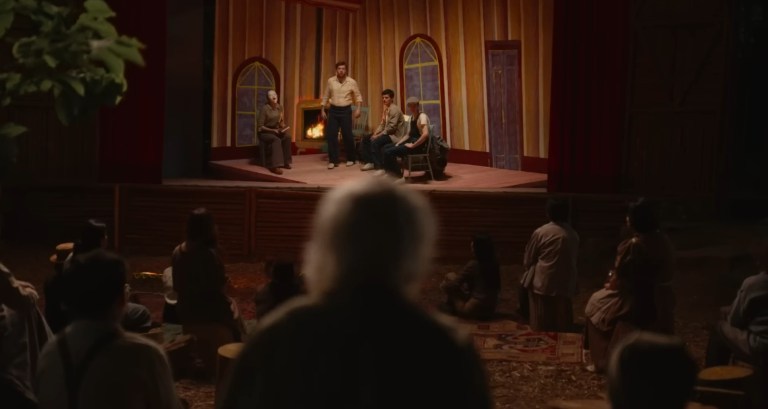
So if Beau has never had sex, how could he ever have three sons? Therein lies the paradox central to Beau’s life. He wants a fulfilling life, but he thinks he can’t have it. He expects an existence filled with pain and loss, and even his dreams end in heartbreak due to a deficiency within himself. But again, this all goes back to things his mother told him, things Beau begins to question.
Beau’s Mother’s House: A Test of Love
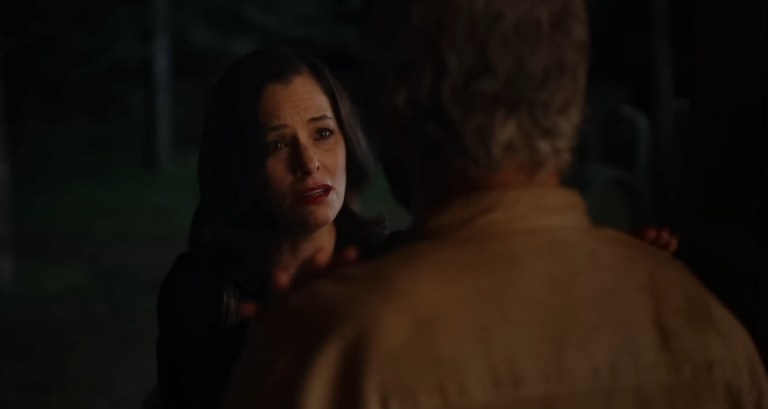
Finally arriving at his mother’s lavish house, Beau has just missed her funeral. He listens to a recording of her service in which he is further guilted for his absence, and he sees the headless body of what is supposed to be his mother. Beau recognizes the body as his mother’s former maid and not his mother, but this isn’t revealed to the audience yet. Beau lies down for a nap, but a woman enters the house twelve hours late for his mother’s funeral. Beau recognizes the woman as Elaine, Beau’s crush he met years ago when they were both young.
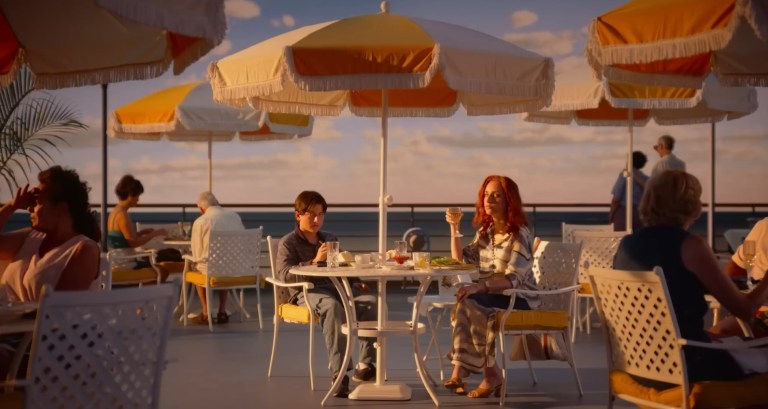
Beau kisses Elaine, and that quickly leads to the two of them having sex in his mother’s bed. Beau thinks he’s going to die like his father did, but when he doesn’t, he is elated. Unfortunately, Elaine does die, further exemplifying Beau’s tragic life where every glimmer of hope is immediately suppressed. Making things worse is that Beau’s mother, Mona, is alive and was watching the whole time.
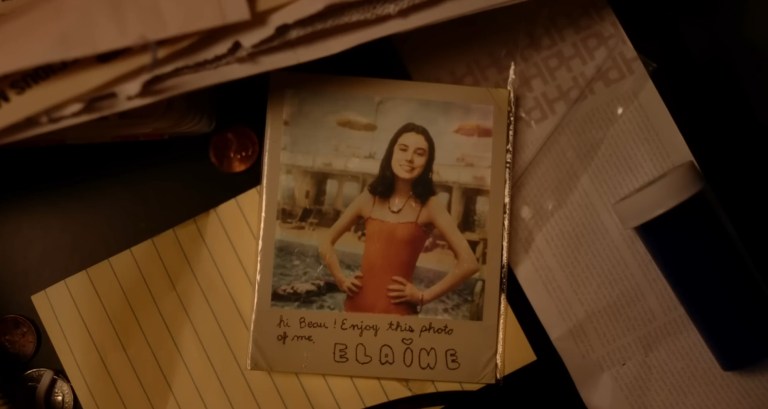
The whole situation with Elaine was a test of Beau’s love orchestrated by Mona. Mona faked her death by, as she tells it, giving her maid enough money so that her entire family can stop working. Mona essentially bought her maid’s life to fake her own death, just so she could guilt her own son into coming over for a visit. On top of that, though it isn’t explicitly stated, it’s entirely likely that Elaine isn’t really the Elaine whom Beau met as a teenager. “Elaine” worked for Mona (as shown on a poster featuring Mona’s employees), and she tells Beau that Mona owes her money. So, Mona hired “Elaine” to come over and test Beau’s loyalty and love. Beau’s mother was holding onto a grudge against a child Beau met decades ago simply for the fact that Beau showed her affection. This points to the terrifying depths of mental manipulation Mona must have inflicted on Beau his entire life.
Floating Away: Beau on Trial
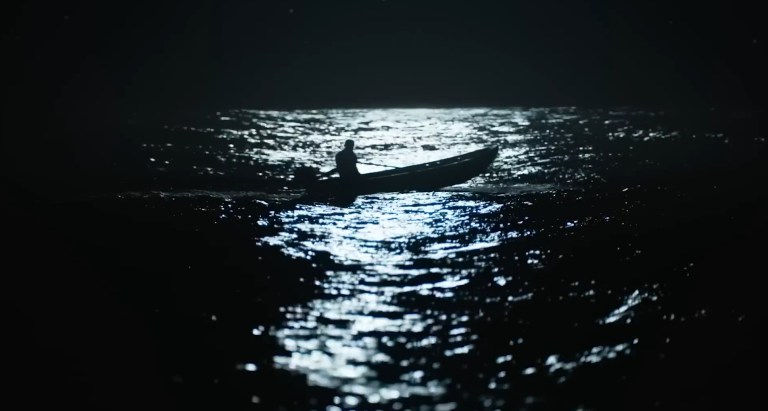
After the incident with Elaine, and after Beau learns that his therapist was also bought by Mona to tell her everything Beau says about her, Beau finally starts to stand up for himself. He wants to know why Mona lied to him about his father, so Mona, in a rage, decides to reveal the truth to her son. The “truth” is revealed in the attic of Mona’s house where Beau’s emaciated twin and a giant penis monster reside (refer to the FAQ question about Beau’s dream for more on the twin, and we’ll let Beau’s penis-monster-father speak for itself).
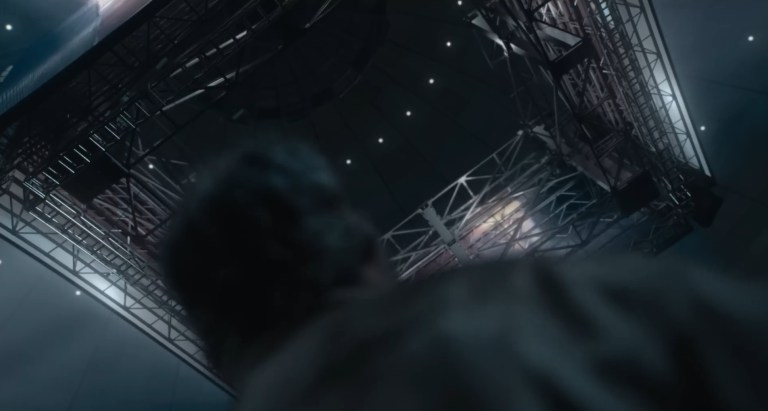
Unable to control himself, Beau’s lifetime of bottled-up anger comes out in the form of his hands choking his mother. Startled at his own actions, Beau stops. It is apparently too late though, and Mona collapses to the floor. Beau leaves the house, getting into a small motorboat and floating away. While still in the boat, Beau finds himself in an auditorium where he is put on trial for his lifetime of crimes against his mother. With an audience watching in gleeful anticipation, Mona’s lawyer loudly lists the injustices Beau has perpetrated against his mother. Beau’s own lawyer can barely be heard and is eventually tossed into the water. The movie ends with the motor on Beau’s boat exploding, capsizing the boat and drowning Beau.
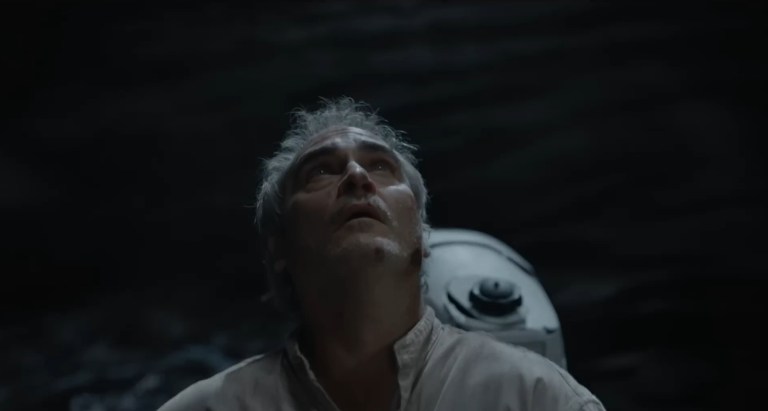
Beau’s trial is a representation of his own feelings of guilt. His protestations of his innocence are barely audible and completely drowned out by the misdeeds he is told that he has done. If he doesn’t love his mother in the way she wants to be loved, he feels guilty. If he does anything for himself, he feels guilty. No matter what he does or doesn’t do, he feels guilty. In Beau’s mind, he is guilty of all these crimes. These feelings, instilled by his mother, ultimately destroy Beau mentally and physically.
Frequently Asked Questions
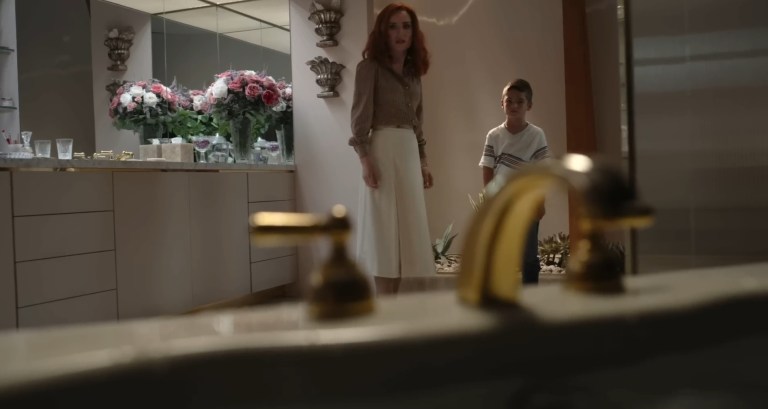
What does Beau’s recurring dream mean?
The dream shows us a pivotal moment in Beau’s life. The twins can be seen as the two sides of Beau himself, his submissive side and his assertive side. This moment in the bathtub is the moment in Beau’s life when his assertive side was locked away forever. From that point on, Beau accepted whatever his mother did to him. This is the moment that led Beau to become the neurotic mess that he is.
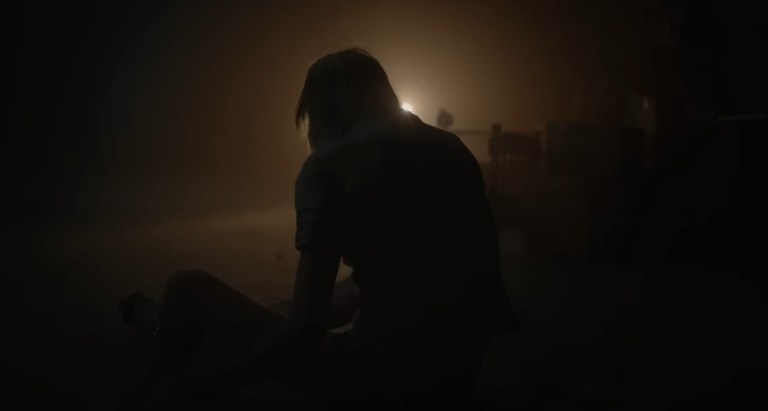
Is Beau an only child?
What does the statue Beau buys represent?
The fact that his mother has the same statue, only much, much bigger, in the yard of her home shows how Mona’s view of their relationship is completely different from Beau’s perspective. It also shows how Mona’s “love” for her son is a dominant part of her life that casts a huge shadow.
Is the strange man in the forest Beau’s father?
Is there a post-credits scene in Beau is Afraid?
Is Beau is Afraid a comedy?
Is Beau is Afraid a horror movie?
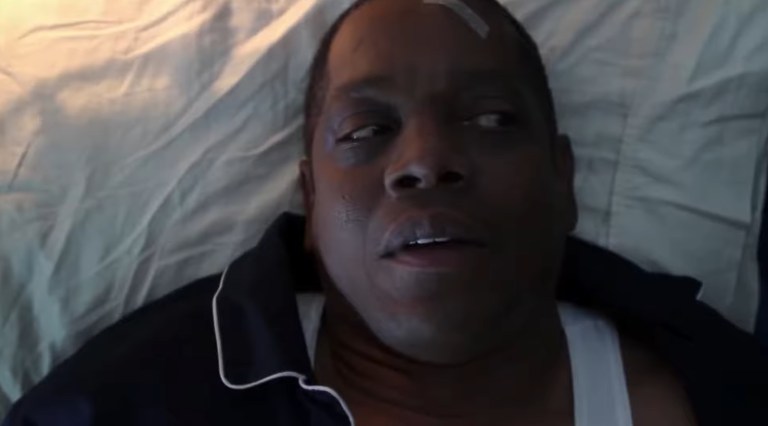
Is Beau is Afraid a remake of Ari Aster’s short film “Beau”?
Ari Aster first developed the script for Beau is Afraid around 2014, and the final film differs even from that version of the story. Even so, it’s fun to look back at “Beau” and see where the seed of an idea started. Unfortunately, “Beau” is now incredibly hard to find since multiple takedowns were issued in the months prior to the release of Beau is Afraid, but you can see a brief write-up on that and other shorts from Ari Aster here: Ari Aster Movies: Tales of Family, Darkness, and Pitch Black Humor
What is Beau scared about?
What is Beau us Afraid rated R for?
Is Beau is Afraid on Netflix?
The Cast of Beau is Afraid
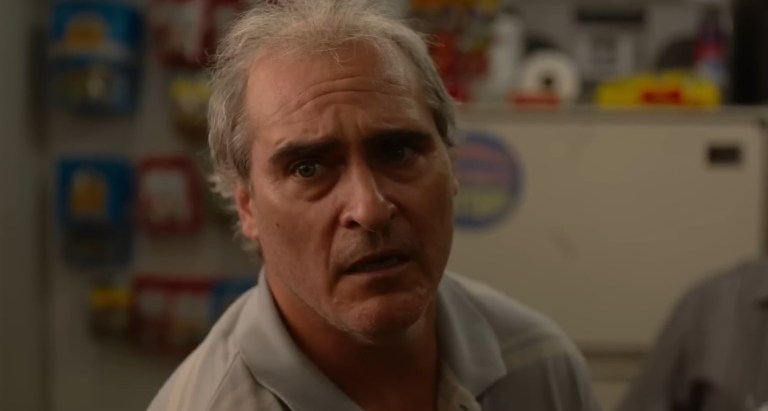
- Joaquin Phoenix as Beau Wassermann, the protagonist of the movie.
- Patty Lupone as Mona Wassermann, Beau’s mother and the main source of his neuroses.
- Parker Posey as Elaine Bray, Beau’s long-lost love whom he waited for.
- Zoe Lister-Jones as Young Mona
- Armen Nahapetian as Teen Beau
- Julia Antonelli as Teen Elaine
- Amy Ryan as Grace, the woman who hopes to keep Beau as her surrogate son.
- Nathan Lane as Roger, Grace’s husband.
- Kylie Rogers as Toni, Grace and Roger’s daughter who is jealous of and angry at Beau.
- Denis Ménochet as Jeeves, a former member of Grace and Roger’s son’s Army unit who suffers from PTSD.
- Stephen McKinley Henderson as Beau’s Therapist, who is secretly recording Beau’s sessions to share with Mona.
- Richard King as Dr. Cohen, who acts as Mona’s lawyer when Beau is put on trial.
- Bill Hader as UPS Guy, the person who finds “Mona” dead in her house.
